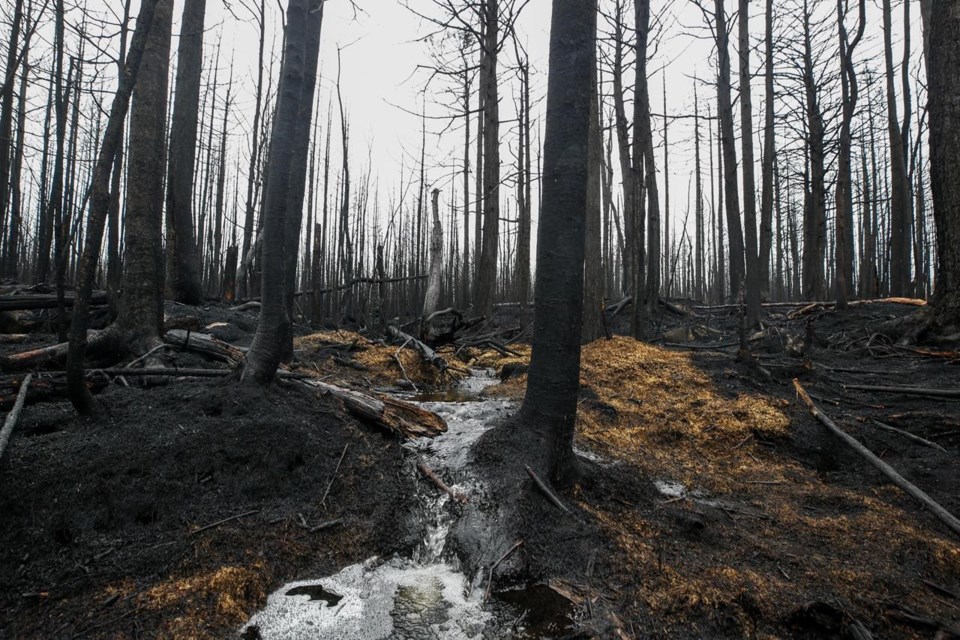HALIFAX — Residents whose homes survived the Halifax-area wildfire say their emotions range from relief over being spared to sadness for neighbours who face rebuilding from the ground up.
Lindsay Lee said that when she and her partner returned to their house Sunday, her anxiety levels fell as they found their home was in good condition, though the refrigerated food had spoiled.
However, the 32-year-old environmental activist said she's aware of people in the area whose houses and pets are gone, and she said the wildfire has convinced her to "redouble" her efforts pressing for policies aimed at reducing global warming.
"It was certainly an emotional day. We're very relieved that our home is there, but heartbroken for people who have not been as lucky," she said in an interview Monday. "It's been a week of anxiety and grief."
Lee, who is employed part time with the Sierra Club and volunteers for several other environmental groups, said weather in the region is becoming much drier, creating "out-of-the-norm" conditions that allow fires to spread more quickly. As she settles back into her community, she's "feeling frustrated about the lack of real action on climate change" and worried that continued reliance on fossil fuels will lead to warming temperatures and more wildfires in the future.
Premier Tim Houston said the province is shifting its focus to getting evacuees back in into their homes as quickly as possible.
“There are many challenging days ahead,” he told a news conference. “The focus is getting you back in your homes .... (And) the weather has helped us for sure.”
Houston said the wet weather has allowed the province to free up water bombers to dispatch to Quebec, where wildfires flared up this past weekend. And he announced the province and Ottawa will each match relief funds raised by the Red Cross, an amount that had reached $1.7-million by Monday.
Stephen Hoskins, who had not yet been able to return to his Halifax-area home, said he knows it is intact, but he's anxiously waiting to see it in person and assess whether his well water will be affected.
The 46-year-old said Monday he knows of two residents on his street who have lost everything, and he said "it will hit harder" when he sees the rubble that is left behind in his subdivision of Highland Park.
"We're still staying with friends, and they've been absolutely wonderful. But we're getting a little frustrated, a little anxious to get back," he said in a telephone interview.
At the height of the evacuations, more than 16,000 people were forced to leave their homes northwest of Halifax, and the city said about 4,886 remained displaced Monday. The city has said about 151 homes were destroyed in the blaze, but there were no reports of deaths or injuries.
The Halifax-area fire is now contained, with an estimated area of 9.5 square kilometres, and the City of Halifax said it is moving into a recovery phase, which includes soil and air-quality testing.
Meanwhile, in southwestern Nova Scotia, the massive Barrington Lake fire continued to burn out of control on Monday, though heavy rain on the weekend helped stop its advance.
“It has been a tough and exhausting week for our community,” the Shelburne County East Emergency Management Office said in a statement Monday. “It hasn’t been easy, but our community is strong and is showing up for one another in every possible way.”
The area received 77 millimetres of rain over the weekend, which enabled firefighters to get closer to the fire and attack it head-on.
At the Shelburne arena, cots were set up for firefighters who have converged on the area from the United States and Newfoundland and Labrador.Â
Throughout the arena, makeshift clotheslines have been set up to dry firefighters' wet, filthy clothing. Hockey nets are also being used for that purpose. And on the safety glass around the rink, local children have placed posters that read, "We Love You” and “Heroes.”
The emergency office said a six-member recovery team from Alberta was expected to arrive in Shelburne on Monday, and provincial assessors were expected to be inspecting properties and infrastructure.Â
In the Shelburne County area, those returning to previously evacuated areas are being told to drink only bottled water until they can flush and disinfect their wells. Emergency officials said if the water smells unusual, it could be contaminated with firefighting chemicals or fuel oils from damaged tanks.Â
The province announced that as of Tuesday it will begin providing free water-testing kits to residents in the evacuation zones.Â
Despite the wet weather, Houston said the risk for more wildfires remains high because the season has just started. The province has recorded 210 wildfires so far this year, about double the number recorded in an average year.
Jackie Norrie, a 55-year-old resident of Hammonds Plains who was evacuated last week, said she understands checks on potential contamination and repairs to infrastructure are creating delays.
She said she’s now part of the “in-betweens group” of people who haven't lost their homes but also can’t return yet.Â
Still, she longs to see for herself that all is well. "I just look forward to seeing my home more closely to see if there is any damage .... I would like to know if it's OK," she said.
This report by The Canadian Press was first published June 5, 2023.
— With files from Morgan Lowrie.
Michael Tutton and Michael MacDonald, The Canadian Press



